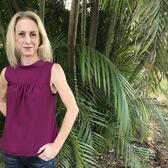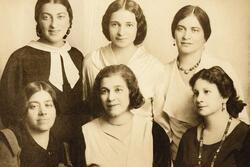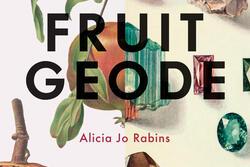Judge Judy: Poetry Muse
Love her or hate her, she’s certainly entertaining, which is why she has won three Emmy Awards. Now in its 23rd season, her show has led syndication ratings for more than half a decade and first-run syndication ratings for more than a decade straight. Judge Judith Sheindlin—the television court judge popularly known as Judy Judy—was number one on the Forbes list of the highest-paid daytime television hosts in 2018. But no one ever mentions the two things that fascinate me about Judge Judy: 1) that she’s an American Jew, and 2) that she intersperses her incisive, sometimes caustic comments—some call them “Judyisms”—with Yiddish.
Despite extensive research, I’ve found surprisingly little personal information about her on the internet. Although there’s press about her marriages (two) and the names of her children (two from her first marriage and three step-children), there’s nothing about her religious affiliation beyond the fact that she was born as Judith Susan Blum to German-Jewish parents: Murray and Ethel, in Brooklyn. And despite her fondness for words like schnook, metziah, and geschichte, all Yiddish of German origin that she likely picked up from her folks, it’s still unclear to me how Judy Judy self-identifies. Does she practice? Is she a cultural Jew who observes the more popular holidays? Is she a Jew in name only? Occasionally, in a case that involves a party, she may allude to planning events such as bar- or bat-mitzvahs. But she never cops to her religious affiliation.
Regardless, I find her to be riveting representation of a Jewish-American feminist, which is what led me to create a project book of poems about her. Some of them, as in the first poem below, include the Yiddish words that she employs like punctuation. Those words are a clear disconnect for her litigants, who don’t know what she’s saying; they write her off as eclectic, cranky, and archaic. What’s even more interesting to me is that Judge Judy also tends to dismiss any phrases her litigants use—which are frequently urban slang—with snide comments about the world going to hell, or about how they abuse the English language.
For this reason, there is an undercurrent of bias that sometimes informs the show. I find it important to acknowledge, rather than dismiss, that there are issues of class and race here, especially because Judge Judy, a rich, educated white woman, can be blunt to the point of rudeness. In fact, she has no patience for the “idiots” and “morons” appearing before her, and she wields privilege in a way that many of today’s viewers might find discomfiting.
In her defense, she is what she sometimes says on air: “an ecumenical abuser,” meaning that she derides whoever she believes deserves it, regardless of race, gender, or ethnicity. Nor does she care what people think about her. She’s often described as gruff, no nonsense, dismissive, irritable, and more. In 2002, Judge Joe Wapner said of her in the New York Post, “Judge Judy is discourteous, and she's abrasive. She's not slightly insulting. She's insulting in capital letters."
As many many minority women who have lived experience often surmise, this same attitude might be more acceptable to the public if she were a man. No doubt she learned this toughness by being the only woman in her law school class, and one of the very few female judges on the family court circuit. Ahead of her time in many ways, she certainly was unable to show signs of softness. Now, she claims that her duty through her show is to force people to take responsibility for their actions, and that her brand of swift justice helps them deal with consequences. Critics say this is untrue, as the production pays for the litigants’ judgements, appearance fees, and travel expenses. But the trade-off is humiliation in front of 10 million viewers.
In the end, say what you will about her. She’s laughing all the way to the bank. And given the wealth of material she provides as a poetry subject, it’s bank for me, too.
THE TRUTH MACHINE, AS DEMONSTRATED BY JUDGE JUDY
She is not a polygraph, does not cuff
the accused to take their vital signs,
display their heart rates, breathing
patterns, systolic and diastolic pressures,
the perspiration a swipe of Secret
can’t control volleying on a monitor
like the radar of a storm no one can
escape, state of emergency that preempts
even this daytime television show
every thirty minutes as required
by station policies. Instead the Truth
Machine uses her senses to gauge
theirs. She feels their bladders fill
and shift like they’re her own, feels them
rage-clench their fists, cross their arms
in defense or defiance. The Truth Machine
sniffs their bacterial sweat from her bench,
through each impermeable screen. She hears
their tongues un-vivify, dry out
like cellophane, their words sticking
to the plastic of their palates. A latter-
day Medusa, she forces them to look
in her eyes—not over there, not down—
and freeze themselves in the lake effect
reflection of their lies, even the ones so
far removed from hue that they are liquid
paper. The Truth Machine is a goddess
sorting out every bit of human mishegoss,
deconstructing the tzimmes, but sometimes,
as deities and devices can, she happens
on a Perseus so practiced in his terrifying
deceptions that he gets off a shot at her head.
“NOW YOU’RE JUST FUMFERING”
also spelled phumphering,
from fonfening, but no matter
how you say it, Judge Judy
will never fall for this
tu quoque defense, argumentum
ad hominem, red herring that’s terrible
for pickling with onions and wine
and sour cream. This is her word
for all of them, compact as a vacuum-
sealed jar, pronounced by sucking
the air out of the mouth, these fonfers
who mumble as if in sleep
and ask their girlfriends or kids
to lie on the stand, who swear it was
someone else, not their fault, offer
whataboutism. Under her whiplash
Yiddish, during a vocabulary
lesson in a language as dead
as yesterday, they fall to ruin
with a stumbling, nasal discourse,
leaving behind the promise
of a collective ear candling,
still trying to convince her
even as she splits the cones open
to find only ashes from the wick
that they were the magicians
who pulled out the deafening silk
handkerchiefs, one by brilliant one.








Outstanding poetry. I love Judge Judy. Watching her here, from my armchair in the UK, her acidic tongue lashings have me in stitches. I heard her say, " ecumenical abuser," twice today so I called on the phenomenon that is Prof Google to see what it meant. This led me to your site and what a delightful discovery it has been. I'm now searching to see what
, "phumphering," and the other Yiddish phrases mean. I love the versitality of the English language and you weald it like a musketeers sword. Congratulations on this poem. I really enjoyed reading it so may you continue in your literary endeavors 👏🏻👏🏻👏🏻
I am a day behind on my dose of respiridone, waiting for the Chemist to process my prescription in the morning, so I have to ride out the night riding out the voices taunting me.
I found this poem reassuring, like I'm not alone, and I only Googled Ecumenical Abuser, because my understanding of the meaning of Ecumenical was an early Christian attempt to unify the different off shoots of early Christianity.
Next time I try magic mushrooms, I will remember to study this poem as I feel it is a bit of prose that cannot be accessed by normal consciousness.
Ecumenical in Law means 'Universal' - so when she tells Plaintiff and Defendant she's an 'Ecumenical Abuser' it means she has no problem disbelieving both sides.